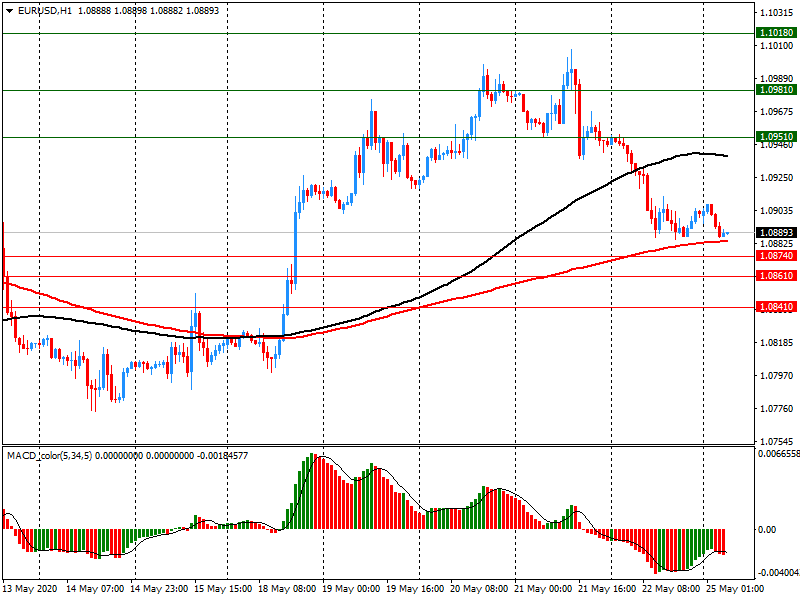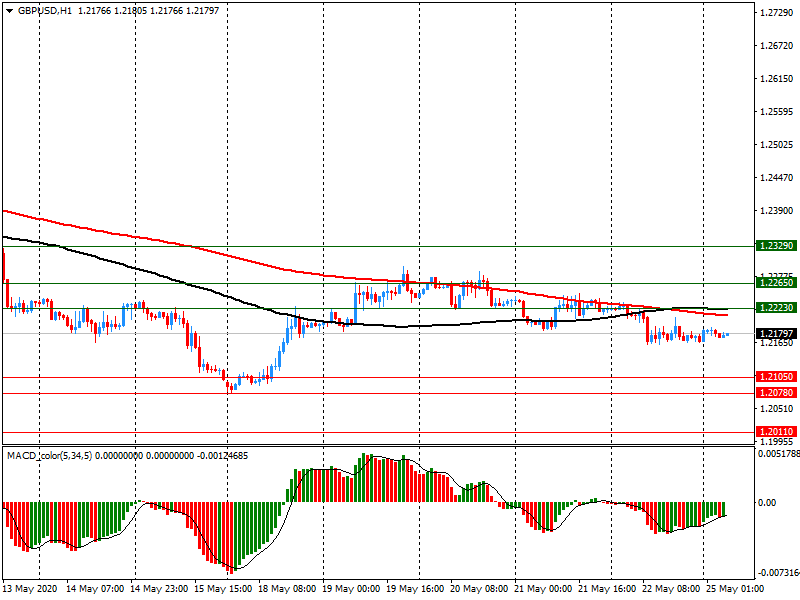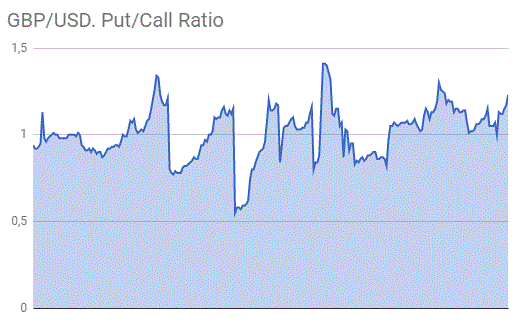- Analytics
- News and Tools
- Market News
CFD Markets News and Forecasts — 25-05-2020
| Time | Country | Event | Period | Previous value | Forecast |
|---|---|---|---|---|---|
| 04:30 | Japan | All Industry Activity Index, m/m | March | -0.6% | |
| 06:00 | Germany | Gfk Consumer Confidence Survey | June | -23.4 | -18.9 |
| 06:00 | Switzerland | Trade Balance | April | 3.2 | |
| 10:00 | United Kingdom | CBI retail sales volume balance | May | -55 | -50 |
| 12:30 | U.S. | Chicago Federal National Activity Index | April | -4.19 | |
| 13:00 | U.S. | Housing Price Index, m/m | March | 0.7% | |
| 13:00 | U.S. | S&P/Case-Shiller Home Price Indices, y/y | March | 3.5% | 3.3% |
| 14:00 | U.S. | New Home Sales | April | 0.627 | 0.49 |
| 14:00 | U.S. | Consumer confidence | May | 86.9 | 88 |
| 17:00 | U.S. | FOMC Member Kashkari Speaks | |||
| 21:00 | Canada | Gov Council Member Wilkins Speaks | |||
| 21:00 | Canada | BOC Gov Stephen Poloz Speaks |
Bloomberg reports that a large bearish position in U.S. equities that’s been amassed by trend-following funds may prove vital to the next move for stocks, according to a strategist who’s been analyzing markets since the early 1990s.
The S&P 500 Index is now trading within 50 points of its 200-day moving average, a metric that’s proved important when breached in the past for changes in positioning by commodity-trading advisors, known as CTAs, according to an analysis from James McCormick at NatWest Markets Plc.
The firm’s signal, which tries to forecast changes in flows by replicating what a generic trend-following strategy would do, is near its most bearish level and positioning is at its biggest net short since 2016, he wrote in the report.
“This level is certainly worth watching,” McCormick, the firm’s global head of desk strategy in London, wrote.
FXStreet reports that it is probably too optimistic to expect both common EU debt and a widespread regulatory roll back, but it may be worthwhile buying a EUR lottery ticket in option space, according to analysts at Nordea. Danske Bank sees upside potential for the shared currency, too.
“We see a very low risk that the Karlsruhe ruling will prove to be a medium-term obstacle for the ECB.”
“If the Franco-German debt proposal (miraculously) passes the test during the coming week and wins the backing from all of the EU-27, we reckon that it would be a major EUR positive event.”
“It will probably be hallelujah days for the EUR, should a new regulatory environment in the Euro area be added to the mix on top of common EU debt. Lawmakers have started pondering whether to roll back MIFID II, which would likely be a big positive for the banking sector profitability specifically and for credit growth in general. The EUR has generally struggled versus USD during the relative tightening of Euro area regulatory burdens versus peers in the US.”
“If we assume that MIFID II is rolled back and that 3M EUR/USD hedge costs remain as low as currently, we make the case that >1.20 readings in EUR/USD could be on the cards.”
FXStreet reports that the headline German IFO Business Climate Index came in at 79.5 in May, firmer than last month's 74.2 while beating the consensus estimates pointing to a reading of 78.3.
Meanwhile, the Current Economic Assessment arrived at 78.9 points in the reported month as compared to last month's 79.4 and 80.0 anticipated.
On the other hand, the IFO Expectations Index – indicating firms’ projections for the next six months, came in at 80.1 for May, up from the previous month’s 69.4 reading and better than the market expectations of 75.0.
Reuters reports that France's state debt to gross domestic product (GDP) ratio is set to increase to more than 115% by the end of the year due to the cost of coronavirus crisis measures, Budget Minister Gerald Darmanin said in an interview with TV station RTL on Sunday.
"It will be no doubt more than 115% at the end of the year," RTL quoted him as saying on its website. He added that the government did not plan to increase taxes to reduce the debt.
At the end of March, the INSEE official statistics agency said that in 2019 gross public debt came in at 98.1% of GDP, unchanged from 2018, although the public sector budget deficit increased to 3.0% of GDP from 2.3% in 2018.
The French government said in April it expected its crisis package to cost 100 billion euros (89.6 billion pounds) - over 4% of GDP. Since then it has announced more support measures, notably for the car industry.
FXStreet reports that analysts at Citibank offer key insights on why is gold’s next move higher, as the bulls look towards $2000/oz.
“Drivers of money flow into safe-haven assets and also support gold amid US-China tension escalation.
The concern of the second wave crisis drove money flow into safe-haven assets.
And also as primary drivers for Citi's bullish gold market thesis.
Gold holdings in ETFs surged to 3.055kt to an all-time high.
Low(er) for long(er) interest rates and global currency debasement.
We think prices are more likely to make a slow grind higher but generally hold a $1,600-1,700 handle, rather than quickly spike to the $1,850-1,950 area.
Global growth and EM recovery in 2021 could be what supports the next leg higher towards $2,000/oz
Good resistance is met around $1,800, with support at $1,682-1720.”
| Time | Country | Event | Period | Previous value | Forecast | Actual |
|---|---|---|---|---|---|---|
| 06:00 | Germany | GDP (QoQ) | Quarter I | -0.1% | -2.2% | -2.2% |
| 06:00 | Germany | GDP (YoY) | Quarter I | 0.4% | -2.3% | -2.3% |
| 06:30 | Switzerland | Industrial Production (YoY) | Quarter I | 1.4% | 0.8% |
During today's Asian trading, the US dollar rose against the euro and the yen. The US currency is also rising in value in a pair with the Chinese yuan amid growing tensions between the two countries.
The euro is under pressure after the publication on Friday of the minutes of the last meeting of the European Central Bank (ECB), which showed that the Central Bank's management does not expect a "V-shaped" recovery of the Euro zone economy after the crisis caused by the coronavirus pandemic.
The minutes also note that the ECB should be ready to adjust the Pandemic Emergency Purchase program (PEPP), as well as its other instruments, if it sees that the scale of the stimulus measures already introduced is insufficient.
The ICE index, which tracks the dollar's performance against six currencies (the euro, swiss franc, yen, canadian dollar, pound sterling and swedish krona), rose 0.06%.
The US dollar exchange rate against the yuan rose by 0.18% to 7.1421 yuan. Growing tensions between Washington and Beijing may lead to a rise in the dollar above the three - month forecast rate of Goldman Sachs-7.15 yuan/$1, analysts at the investment bank say.
Relations between the US and China deteriorated sharply after Washington accused the Chinese authorities of not disclosing information about the outbreak of coronavirus infection quickly enough. In addition, the parties disagree on the issue of Hong Kong, where Beijing is seeking to strengthen its leadership.
Over the weekend, Chinese foreign Minister Wang Yi said that certain forces in the United States are pushing countries towards a new "cold war", calling on Washington to abandon attempts to change China.
According to the report from Federal Statistical Office (FSO), industrial production rose by 0.8% in the 1st quarter 2020 in comparison with the same quarter a year earlier. At –0,4%, turnover declined for the first time in three years. The negative effects of the COVID-19 pandemic have impacted on the results of February and March.
In comparison with the previous year industrial production grew in January by 3.0%, in February by 0.1%, then fell in March (–1.9%). For the whole of the 1st quarter 2020 production increased by 0.8% in comparison with the same quarter a year earlier.
Construction production increased by 4.1% in the 1st quarter 2020 in comparison with the same quarter a year earlier. Production declined by 0.5% in building, civil engineering in contrast registered an increase (+5.7%). Lastly, specialised construction activities registered an increase of 6.4% in their production.
Industrial turnover in January rose by 0.7% in comparison with the previous year, it fell in February (–1.9%) as well as in March (–4.4%). For the whole of the 1st quarter 2020 in comparison with the same quarter a year earlier, turnover registered a decline of 1.3%.
Construction turnover rose by 4.0% in 1st quarter 2020 in comparison with the same quarter a year earlier. Turnover rose by 1.2% in building, civil engineering registered an increase of 6.2%, specialised construction activities an increase of 6.0%.
As the Federal Statistical Office (Destatis) reported in its press conference and first release of 15 May 2020, the gross domestic product (GDP) was down by 2.2% on the 4th quarter of 2019 upon price, seasonal and calendar adjustment. That was the largest decrease since the global financial and economic crisis of 2008/2009 and the second largest decrease since German unification. A larger quarter-on-quarter decline was recorded only for the 1st quarter of 2009 (-4.7%). Although the spread of the novel coronavirus did not have a major effect on the economic performance in January and February, the impact of the pandemic was quite serious even for the 1st quarter of 2020.
Due to the coronavirus pandemic and the restrictions related with it, households consumed much less in the 1st quarter of 2020 than in the 4th quarter of 2019. Household final consumption expenditure decreased by 3.2% on the previous quarter after price, seasonal and calendar adjustment. Gross fixed capital formation in machinery and equipment was down by as much as 6.9%. Final consumption expenditure of general government and gross fixed capital formation in construction had a stabilising effect. They prevented an even larger GDP decrease. While general government final consumption expenditure rose by 0.2%, gross fixed capital formation in construction increased considerably by 4.1% from the 4th quarter of 2019.
Foreign trade also declined in the 1st quarter of 2020. According to provisional calculations, exports were down 3.1% from the 4th quarter of 2019 after price, seasonal and calendar adjustment. While exports of goods decreased by 4.0%, exports of services increased slightly by 0.7 %. Imports of goods and services were down 1.6%.
The German economy slumped also in a year-on-year comparison. GDP in the 1st quarter of 2020 was down a price-adjusted 1.9% and a calendar-adjusted 2.3% from a year earlier. Only during the years of the financial and economic crisis of 2008/2009 had there been stronger year-on-year declines, the largest one (-7.9%) was observed in the 2nd quarter of 2009 (a calendar-adjusted -6.9% in the 1st quarter of 2009).
CNBC reports that the number of confirmed coronavirus cases globally rose above 5.4 million, data compiled by Johns Hopkins University showed.
In Japan, the government is seeking to end the state of emergency for Tokyo and other areas while considering $1 trillion in fresh stimulus for the battered economy.
Ahead of the Memorial Day holiday weekend, all states in the U.S. began to lift some restrictions implemented to halt the spread of the coronavirus. Government officials are still urging people to practice social distancing and to wear masks in public.
China’s top diplomat criticized U.S. efforts to hold China accountable for its alleged role in the spread of the coronavirus, calling any aims to force Beijing to pay compensation for the coronavirus a “daydream.”
Global cases: More than 5.4 million
Global deaths: At least 345,059
Countries with the most cases: United States (more than 1.6 million), Brazil (363,211), Russia (344,481), United Kingdom (260,916), Spain (235,772)
EUR/USD
Resistance levels (open interest**, contracts)
$1.1018 (1692)
$1.0981 (1263)
$1.0951 (1482)
Price at time of writing this review: $1.0889
Support levels (open interest**, contracts):
$1.0874 (1636)
$1.0861 (784)
$1.0841 (1426)
Comments:
- Overall open interest on the CALL options and PUT options with the expiration date June, 5 is 92979 contracts (according to data from May, 22) with the maximum number of contracts with strike price $1,0700 (5276);
GBP/USD
Resistance levels (open interest**, contracts)
$1.2329 (606)
$1.2265 (324)
$1.2223 (263)
Price at time of writing this review: $1.2180
Support levels (open interest**, contracts):
$1.2105 (1051)
$1.2078 (1409)
$1.2011 (1142)
Comments:
- Overall open interest on the CALL options with the expiration date June, 5 is 23784 contracts, with the maximum number of contracts with strike price $1,3500 (3420);
- Overall open interest on the PUT options with the expiration date June, 5 is 29689 contracts, with the maximum number of contracts with strike price $1,3500 (3095);
- The ratio of PUT/CALL was 1.25 versus 1.24 from the previous trading day according to data from May, 22
* - The Chicago Mercantile Exchange bulletin (CME) is used for the calculation.
** - Open interest takes into account the total number of option contracts that are open at the moment.
| Raw materials | Closed | Change, % |
|---|---|---|
| Brent | 35.24 | -2.06 |
| Silver | 17.17 | 0.59 |
| Gold | 1735.239 | 0.51 |
| Palladium | 1960.59 | -3.55 |
| Index | Change, points | Closed | Change, % |
|---|---|---|---|
| NIKKEI 225 | -164.15 | 20388.16 | -0.8 |
| Hang Seng | -1349.89 | 22930.14 | -5.56 |
| KOSPI | -28.18 | 1970.13 | -1.41 |
| ASX 200 | -53.4 | 5497 | -0.96 |
| FTSE 100 | -21.97 | 5993.28 | -0.37 |
| DAX | 7.94 | 11073.87 | 0.07 |
| CAC 40 | -0.89 | 4444.56 | -0.02 |
| Dow Jones | -8.96 | 24465.16 | -0.04 |
| S&P 500 | 6.94 | 2955.45 | 0.24 |
| NASDAQ Composite | 39.71 | 9324.59 | 0.43 |
| Time | Country | Event | Period | Previous value | Forecast |
|---|---|---|---|---|---|
| 05:00 | Japan | Leading Economic Index | March | 91.9 | 83.8 |
| 05:00 | Japan | Coincident Index | March | 95.4 | 90.5 |
| 06:00 | Germany | GDP (QoQ) | Quarter I | -0.1% | -2.2% |
| 06:00 | Germany | GDP (YoY) | Quarter I | 0.4% | -2.3% |
| 06:30 | Switzerland | Industrial Production (YoY) | Quarter I | 1.6% | |
| 08:00 | Germany | IFO - Expectations | May | 69.4 | |
| 08:00 | Germany | IFO - Current Assessment | May | 79.5 | |
| 08:00 | Germany | IFO - Business Climate | May | 74.3 | |
| 13:00 | Belgium | Business Climate | May | -36.1 | |
| 17:30 | Canada | BOC Gov Stephen Poloz Speaks | |||
| 22:45 | New Zealand | Trade Balance, mln | April | 672 |
| Pare | Closed | Change, % |
|---|---|---|
| AUDUSD | 0.65349 | -0.37 |
| EURJPY | 117.306 | -0.46 |
| EURUSD | 1.09016 | -0.41 |
| GBPJPY | 130.902 | -0.51 |
| GBPUSD | 1.21659 | -0.46 |
| NZDUSD | 0.60929 | -0.4 |
| USDCAD | 1.40022 | 0.35 |
| USDCHF | 0.97097 | 0.04 |
| USDJPY | 107.6 | -0.05 |
© 2000-2026. All rights reserved.
This site is managed by Teletrade D.J. LLC 2351 LLC 2022 (Euro House, Richmond Hill Road, Kingstown, VC0100, St. Vincent and the Grenadines).
The information on this website is for informational purposes only and does not constitute any investment advice.
The company does not serve or provide services to customers who are residents of the US, Canada, Iran, The Democratic People's Republic of Korea, Yemen and FATF blacklisted countries.
Making transactions on financial markets with marginal financial instruments opens up wide possibilities and allows investors who are willing to take risks to earn high profits, carrying a potentially high risk of losses at the same time. Therefore you should responsibly approach the issue of choosing the appropriate investment strategy, taking the available resources into account, before starting trading.
Use of the information: full or partial use of materials from this website must always be referenced to TeleTrade as the source of information. Use of the materials on the Internet must be accompanied by a hyperlink to teletrade.org. Automatic import of materials and information from this website is prohibited.
Please contact our PR department if you have any questions or need assistance at pr@teletrade.global.


















